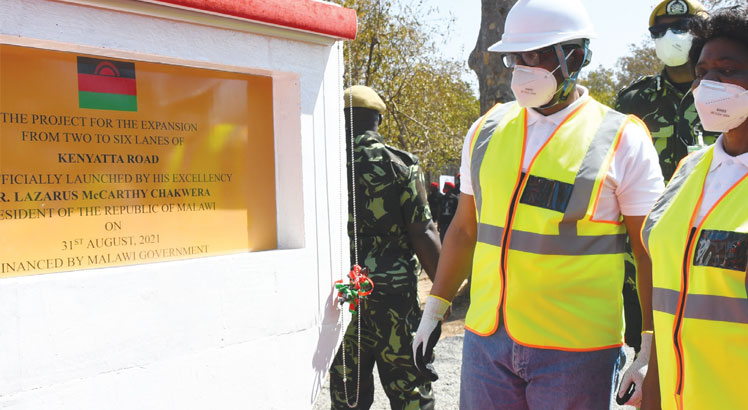No change in contracts monopoly
Even with the presence of clear laws and policies to prefer indigenous businesses, public procurement continues to favour ‘big’ foreign firms, casting a doubt whether the Tonse administration will break this monopoly to benefit small and medium enterprises (SMEs) .
Our findings, based on corroborated interviews, show that a number of public bodies—ministries, departments and agencies (MDAs) otherwise legally referred to as procuring entities continue to favour foreign-owned firms over Malawian companies—which is not only against the law but also against the presidential directive.
Section 44 (10) of the Public Procurement Law (2017) state that “a procuring entity shall ensure prioritisation of all bids submitted to give preference to 60 per cent indigenous black Malawians and 40 per cent others for national competitive bidding”.

In a circular dated July 1 2020 (Ref. No. PPDA/01/22), just less than a week after a new administration came in, the Public Procurement and Disposal of Assets Authority (PPDA) asked procuring entities to live by the spirit of the law to ensure that in all national competitive bidding –indigenous black Malawians are give a 60 percent opportunity.
The circular further demanded that where they cannot
give priority to indigenous Malawians they must justify their decision to the authority.
To ensure that indigenous firms fully benefit from public procurement, the National Construction Industry Act (order of 2014) stipulates that a foreign construction firm wishing to provide construction services in Malawi shall be required to provide those services in association with a member practice or local firm.
Reads the law in part: “A member practice, whether in a joint venture or a subcontract arrangement shall be responsible for a minimum of 30 percent of the works by volume and value.”
But Malawi Business Contractors and Allied Trade Association (Mabucata) vice-chairperson Kondwani Kadango said these provisions of the law are not followed as most foreign firms work alone in construction works in Malawi.
He said most foreign firms will subcontract a local one just for minor work to fulfil the requirement of the law without living up to the 30 percent demand.
Kadango also complained of what he called monopoly of projects by international firms that have also registered locally at the expense of local firms.
He said the law ought to be clear on who is local or international citing a case of Mota Engil which is a foreign-owned firm but registered in Malawi.
While admitting that local ones may not fully have capacity, Kadango observed that the joint venture agreement or subcontracting advocated by the NCIC is important to build capacity. He said sometimes government
is lenient towards international or foreign firms.
In an interview, Network of Indigenous Business People chairperson Kettie Kamwangala while applauding the policy intent by the new administration, said more ought to be done to break what she called a cartel that has captured public procurement.
She said some MDAs are responding favourably to the presidential directive but many remain rigid to change.
Kamwangala said there is also need for clarity in terms of policy on who is considered an indigenous Malawian businessperson as this creates confusion on who the policy is targeting.
Some members of Kamwangala’s network recently waged war against some firms owned by Malawians of Asian origin which they accuse of monopolising procurement opportunities. .
National Associations for Micro Small and Medium Enterprises Trust (Nasme) chairperson William Mwale said the business environment in Malawi is not conducive for SMEs because of the way the public payment system operates.
He said the new administration, like those before, may have good intentions but until they improve the business environment, the fresh policy statements are unlikely to yield anything.
Mwale said most SMEs have a narrow financial base; hence, there is a need for deliberate funding mechanisms or
flexible loans that will allow small business entities to easily participate in business.
“You supply to government and they take years before paying you. How do you survive? We have several cases of people who have supplied to government and spend months chasing for payment. It is these bottlenecks that naturally make SMEs less competitive,” he said.
Mwale too asks for clarity in the law and policy to define who the indigenous black Malawians are, saying this sounds insensitive and sort of discriminatory in nature.
He a l so appea l ed to government to have specific allocations of funds to SMEs or business opportunities in which only these can compete so that they grow their capacity.
In March this year, President
Lazarus Chakwera directed MDAs to prioritise local goods and services in their procurement and to buy from local SMEs.
In a circular (ref. NO: SPC/5/001), dated August 17 2020 the Secretary to President and Cabinet Zanga-Zanga Chikhosi stressed on the need to adhere to the presidential order and further appealed to MDAs to ensure that the NCIC order of 2014 is strictly followed.
Recenttly, Chakwera also spoke against “monopolistic business tendency” where a few individuals and companies make multiple applications for a single government contract, stressing that his administration will stop it.
He said the net effect of this practice is that the contracts across MDAs are concentrated in a few hands who benefit from one regime to another at the expense of the rest of the citizens.
Chakwera said the time has come to break what he called the “stupid monopoly “ and replace it with government policies, legislation and practice that promote inclusive economic growth.
Government in 2009 developed a Buy Malawi Strategy (BMS) which expired in 2014 without much to show for it. The strategy, among others, sought to improve the public procurement system to favour local suppliers and supplies.
In 2015, former president Peter Mutharika renewed the BMS for another five years, with an admission that the first one did not succeed. But this one too seems to have flopped as Malawians continue to prefer imported products at the expense of local producers.





